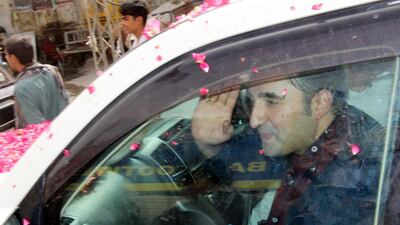For Pakistanis watching the soap opera of their country's dynastic political elite, speculation over the wealth of their leaders is a popular pastime.
The upcoming general election has again given voters a glimpse into the bank accounts and property portfolios of their leaders after election officials revealed assets declared on candidate's papers.
Detailed declarations of bullet proof cars, jewellery, thousands of acres of land and foreign properties have made headlines.
But in a world after the Panama Papers scandal revealed the web of finances hidden in offshore firms, there is also little belief that the declarations tell the full story.
That scandal, which prompted the departure and then prosecution of prime minister Nawaz Sharif for allegedly hiding assets, may also have raised the stakes of the pre-election disclosures.
_______________
Read more:
Killing of Pakistan Taliban leader could prompt power struggle
Malala Yousafzai returns to her hometown in Pakistan for the first time since assassination attempt
_______________
People in Pakistan are angry with politicians who “talk poor but are filthy rich”, said Jan Achakzai, a political commentator. People do not believe their stories, he added.
He said: “The discrepancy between their life styles and their earnings makes you wonder whether they are truthful to the people of Pakistan when they are signing these papers.
“People now look at them with even more suspicion because of the Panama Papers scandal.”
According to declarations published in Dawn newspaper, the country's largest English language daily, Mr Sharif's daughter Maryam has declared a total of 845m rupees (Dh25m) worth of assets.
Maryam, who is seen as likely to one day take his place as leader of the PML-N party, said that included 188 acres of farmland and shares in multiple mills and textile companies.
The former president Asif Ali Zardari declared total assets of 758m rupees (Dh23m). His papers show he uses six bulletproof luxury vehicles, owns thousands of acres of agricultural land, property in Dubai and has spent millions of rupees on his passion for weapons, horses and livestock, the paper reported.
He has a work permit for the Emirates and owns over a dozen properties in Pakistan, as well as his share in five properties inherited from his assassinated wife, Benazir Bhutto.
Mr Zardari, who was president from 2008 to 2013 owned up to three Toyota Land Cruisers, two BMWs and one Toyota Lexus, all of them bulletproof.
An unspecified number of horses and cattle he owns are worth Rs 9.9m (Dh300,000) while he also possesses “arms and ammunition” worth Rs16.60m (Dh500,00).
His son, Bilawal Bhutto-Zardari, chairman of the Pakistan Peoples Party, is reportedly better off, having declared around twice as much wealth as his father, including about two dozen properties in and outside Pakistan as well as investments and bank accounts in Dubai and the UK.
Imran Khan, the cricketer-turned politician who chairs the Pakistan Tehreek-e-Insaf (PTI), declared 38 million rupees (DH1.1m) worth of holdings.
Politicians tend to be economical with the truth about their holdings to avoid tax, analysts say, increasing the public anger at their lack of disclosure. But the furore over the Panama Papers has shown how alleged discrepancies can be used as powerful political weapons.
The massive 2016 leak of documents from the Panamanian law firm Mossack Fonseca became a political storm in Pakistan when it linked Mr Sharif's children to offshore companies.
He denied any wrongdoing, but he was disqualified from office for life when a court ruled he was dishonest in not disclosing his earnings from a Dubai-based company in his nomination papers.
Mr Sharif blames the army for his downfall, saying it manipulated the investigation to oust him and rein in civilian power.

